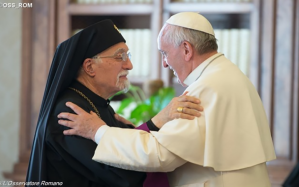
Pope Francis sparked off a diplomatic controversy on Sunday, angering Turkey with his description of the mass killings of Armenians back in 1915 as "genocide."
According to Francis X. Rocca and Emre Peker of the Wall Street Journal, the pope made his remarks during a mass in St. Peter's Basilica at the Vatican on Sunday to mark 100 years since the killings. He placed the massacres within the modern context of Christians being persecuted in the Muslim world.
"Concealing or denying evil is like allowing a wound to keep bleeding without bandaging it," Francis said.
The pope added that it was "necessary, and indeed a duty," to "recall the centenary of that tragic event, that immense and senseless slaughter whose cruelty your forbears had to endure." According to the Wall Street Journal, he urged Muslim leaders to denounce the actions of extremists and all Christians to unite against violence directed at them.
The Wall Street Journal reported that Turkey has reacted to the pope's remarks by recalling its ambassador to the Vatican back to Ankara. In addition, Turkish Prime Minister Ahmet Davutoglu described the comments as "not fitting of the Pope."
"The Pope's declaration, divorced from historical and legal facts, is unacceptable," Turkish Foreign Minister Mevlut Cavsoglu said. "Religious posts are not positions to stoke hatred and grudges on baseless claims."
However, Michael E. Miller of the Washington Post reported that Turkey's furor over describing the Armenian mass killings of 1915 as genocide is nothing new. Even Turkey itself has been divided on whether or not to call that event genocide; public figures who have uttered the word in that country have either been forced to flee or thrown into prison.
"It's become hugely politicized," Eugene Rogan, director of Oxford University's Middle East Center, said. "Turkey is a NATO ally and the Turkish government responds very negatively to anybody raising the question of genocide. So it's in that context that the furor over the pope's comments should be viewed."
Taner Akcam, a Turkish professor of history at Clark University, told Miller that Turkey's attitude of denial of what happened to Armenians was similar to how South Africa viewed apartheid.
"In order to understand Turkey and its denialism, you have to compare it to apartheid in South Africa," Akcam said. "If Turkey wants to play an important role in the political development in the Middle East, Turkey has to face its own history."
Thomas de Wall described to the Washington Post the context behind what happened to the Armenians back in 1915. The Turks, who were part of what was known as the Ottoman Empire, sided with Germany in World War I; they accused the Christian Armenians of "sympathizing with Russia."
"[Turkish leader Mehmed Talat Pasha] ordered the deportation of almost the entire people to the arid deserts of Syria," de Wall said. "In the process, at least half of the men were killed by Turkish security forces or marauding Kurdish tribesmen. Women and children survived in greater numbers but endured appalling depredation, abductions, and rape on the long marches."
Related: Kim Kardashian, Kanye West Travel to Holy Land to Baptize Daughter North West
Rogan told the Washington Post that their goal was to prevent the Armenians from gaining "a critical demographic mass that might seek independence."
"That was the logic behind the genocide," Rogan said. "Then the question was, 'Who is going to do it?' because massacring hundreds of thousands of people is horrible, violent work. There is documentation to show that the Ottoman government released prisoners, convicted murderers and created gangs to actually do the butchery."
However, Rogan noted that the word "genocide" did not exist until a Jewish lawyer named Raphael Lemkin invented the phrase in the aftermath of World War II.
"When Raphael Lemkin was devising the arguments around a new crime called 'genocide' after the Jewish holocaust in World War II, he really took the Armenian genocide as his prior example to base the concept on," Rogan said. "Because of the scale of killing, because of the [Turkish] government's involvement in how to do this ... so it was very much with the Armenian genocide in mind that Lemkin coined the phrase 'genocide.'"
According to the Wall Street Journal, the pope also called for reconciliation between Turkey and Armenia. His remarks came during the centenary of what Armenians described as "Metz Yeghern," which translators at the Vatican rendered as "Great Evil."






